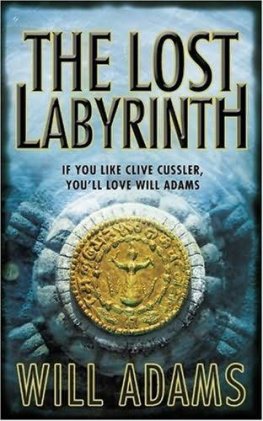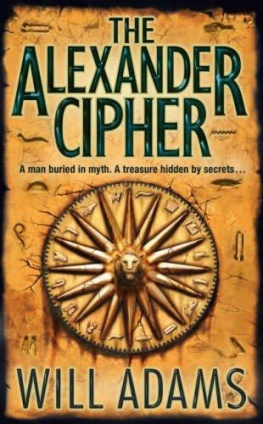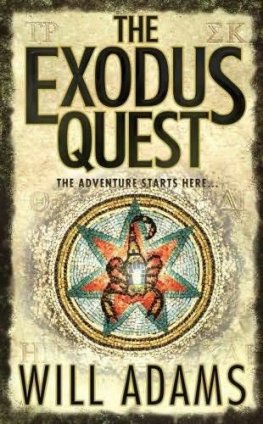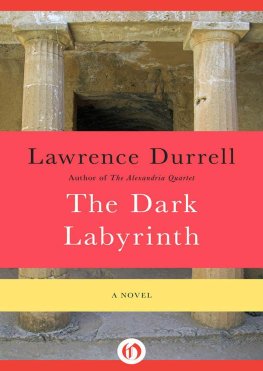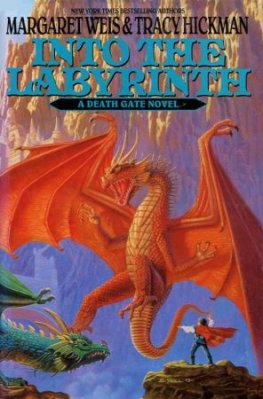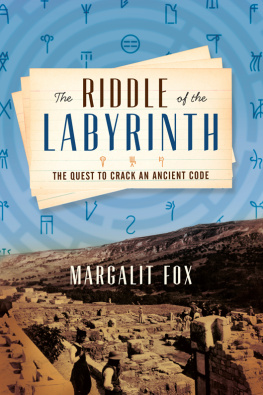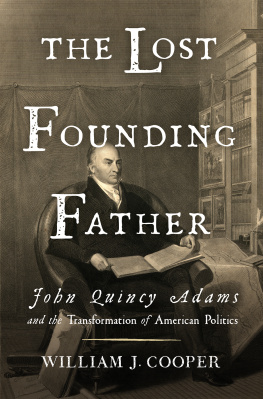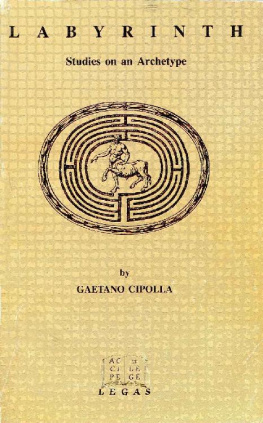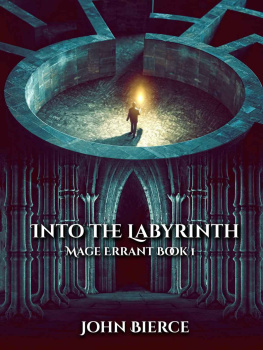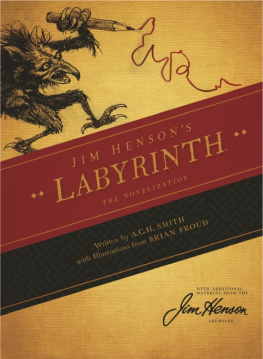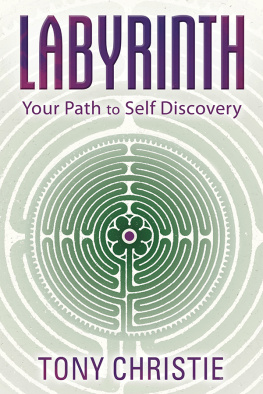Will Adams - The Lost Labyrinth
Here you can read online Will Adams - The Lost Labyrinth full text of the book (entire story) in english for free. Download pdf and epub, get meaning, cover and reviews about this ebook. genre: Adventure. Description of the work, (preface) as well as reviews are available. Best literature library LitArk.com created for fans of good reading and offers a wide selection of genres:
Romance novel
Science fiction
Adventure
Detective
Science
History
Home and family
Prose
Art
Politics
Computer
Non-fiction
Religion
Business
Children
Humor
Choose a favorite category and find really read worthwhile books. Enjoy immersion in the world of imagination, feel the emotions of the characters or learn something new for yourself, make an fascinating discovery.
- Book:The Lost Labyrinth
- Author:
- Genre:
- Rating:3 / 5
- Favourites:Add to favourites
- Your mark:
- 60
- 1
- 2
- 3
- 4
- 5
The Lost Labyrinth: summary, description and annotation
We offer to read an annotation, description, summary or preface (depends on what the author of the book "The Lost Labyrinth" wrote himself). If you haven't found the necessary information about the book — write in the comments, we will try to find it.
The Lost Labyrinth — read online for free the complete book (whole text) full work
Below is the text of the book, divided by pages. System saving the place of the last page read, allows you to conveniently read the book "The Lost Labyrinth" online for free, without having to search again every time where you left off. Put a bookmark, and you can go to the page where you finished reading at any time.
Font size:
Interval:
Bookmark:
Will Adams
The Lost Labyrinth
PROLOGUE
Crete, 1553 B.C.
The food hadn't quite run out yet, but it would soon. And last night the snows had arrived, laying a white blanket over the plain, cutting off the pass. No relief would be coming now. Not for a month at least. More likely not until spring.
It was over.
The fire had gone out days before. There was no more wood. Not that Pijaseme needed a brand to navigate these caves. They were a natural labyrinth, yet he knew them better than any man who'd ever lived. He'd spent fifty-two summers in the service of the gods here, presiding for the last ten over the temple outside, during which time he'd led the discovery and consecration of three new galleries. But he kept his hand to the wall all the same. So much had changed these past years that it was reassuring to know that some things were immutable.
He could remember the moment still. It had emblazed upon his mind. For years, the goddess had been angry. For years, he and his fellow high priests had sought to understand their offence, the better to make reparation. But each of them had offered different solutions, and the goddess had grown unhappier. He'd been on the final descent to Knossos for the great harvest gathering when a light like sunrise had burst upon the northern horizon. For a moment he'd been euphoric: he'd prayed all his life that the goddess herself would come while he yet lived. But then he'd realised she'd come in anger.
And what anger!
Her roar had deafened him for days. Her hail of molten rock had set forests on fire all across the island. The waves she'd sent, as tall as mountains, had destroyed their fleets and ports. She'd blacked out the sky for many moons and assailed them with an extraordinary violence of storms. Ash had fallen calf deep upon their fields, killing their crops and trees and herds, blighting them with boils and deadly wasting diseases and causing this brutal, endless famine.
He reached the great gallery. It was brighter than he could ever remember, the sunlight that filtered through the thin crevice in its roof magnified by the mirrors of snow around its edges. A flake fell coldly against his temple, then ran like a tear down his cheek. He watched more arrive, fluttering slow as tiny feathers. Perhaps this was what the island needed. A purge of clean pure snow. Perhaps when it melted, it would take the ashes of the past with it, and the island would be born anew.
But Pijaseme wouldn't be there to see it.
He'd already prepared the poppy-juice. Now he poured it into the goblet. A gust of wind played the crevice like a horn as he did so. The Minotaur was roaring. He looked up at it towering above him, set there by the gods themselves as guardian of the island's oldest and most sacred labyrinth, which was why so many craftsmen and architects had made the pilgrimage here, to glean inspiration for their palaces. He poured a small libation in the basin at its feet before draining the rest in one go, grimacing against the taste. Then he walked down the corridor of axes to the great throne, where he set the bull's mask and horned crown upon his head and tried to buckle the sacred robe around his throat. But he was too weak from age and hunger to bear its weight, so he left it draped over the throne's high shoulders instead.
The poppy-juice began to ply its comforts. He felt his goddess smile, pleased by his choice of penance. He picked up the bone-handled knife and teased the wrinkled pale skin of his inner forearm with its tip.
It had been a fearful time, not knowing why the world had changed, or what to do. Survivors had converged on Knossos from every corner of the island, seeking comfort in numbers, terrified not merely by the cataclysms, but also by the knowledge that there was nothing now to prevent their one-time subjects coming here to take their revenge for all the casual cruelties they'd suffered at their hands. Nothing to stop them looting the holiest places of their sacred treasures, either.
It had been Pijaseme himself who'd suggested a solution to this latter problem-hiding all those treasures here, in the sure knowledge that no outlander would ever find them. He'd stood up before the council and given his oath that the goddess herself had visited him in a dream, and so ordered. They'd all been so eager for her forgiveness that they'd acquiesced at once. The treasures had duly arrived over the next few moons, Pijaseme giving each party in exchange a receipt for what they'd brought, along with a fired clay disc imprinted with signs so that their successors could find this labyrinth again, should none of them still be alive when finally the island recovered.
How he'd exulted as the treasures had stacked up! He'd been certain that the goddess would reward him. But her anger hadn't died. If anything, it had grown more savage, more personal. While other communities had seemed to reach and pass through the worst of this blight, his own had suffered more and more. She'd taken his surviving children, and their children and grandchildren too, until only he and his beloved grandson Eumolpos had been left of their once great family. And finally he'd acknowledged in his heart the true reason for her fury. There had been no dream. He hadn't brought these treasures here for her glory; he'd brought them for his own.
The exodus had taken place earlier that summer, when it had become clear that yet again there'd be no harvest. Eumolpos had taken charge, scavenging for wood in the mountains, dragging the timbers down to the coast, building a ship in which the few survivors had sailed north in search of a new land to settle. Their ancestors had arrived here from across the sea, after all. It seemed only fitting that they should leave that way too.
It had been a wrench to watch them go. Eumolpos had been Pijaseme's heir as high priest at the temple. But there was no temple any more: Poseidon earth-shaker had seen to that. And at least this way Eumolpos would carry with him his memories, his knowledge of the sacred objects and rituals. At least this way, the goddess would still be worshipped. Before he'd left, Eumolpos had asked Pijaseme to go with them, albeit with lowered eyes. But Pijaseme was too old and proud. Besides, he'd taken a sacred vow to look after these treasures to the death. And, to the death, he would.
Despite the poppy-juice, the pain was fierce as he stabbed through the leathern skin of his wrist, then gashed jaggedly upwards along his forearm. He didn't let it stop him though, not with the goddess watching. He switched the blade from hand to hand, then slashed his other forearm too. Blood fell in slow waterfalls to form red lakes upon the dusty rock.
It was fitting. It was as it should be.
It had been his life to please the goddess. And he had failed.
ONE
Broward County Jail, Fort Lauderdale, Florida
'Visitor,' grunted the guard, heaving open the heavy steel door of Mikhail Nergadze's cell. 'Come with me.'
Mikhail took his time rising to his feet. It was a point of self-respect in places like these that you never gave the uniforms anything for free. Besides, he already knew who it would be. That court-appointed psychologist with her sneering upper lip and her aggressively folded arms. He'd always had an instinct for women like her. And sure enough, she was waiting impatiently for him in the dusty white-tiled interview room, dressed with her customary sharp-edged chic in a navy suit jacket and pencil skirt, her black hair cropped almost as short as his own prison crew-cut, just the faintest touches of perfume and make-up. Yet, he noted, faint though those touches of perfume and makeup might be, they were still there.
'Mister Nergadze,' she said sourly, enunciating each syllable like an insult.
'Doctor Mansfield,' he nodded. 'This is a pleasure.'
Font size:
Interval:
Bookmark:
Similar books «The Lost Labyrinth»
Look at similar books to The Lost Labyrinth. We have selected literature similar in name and meaning in the hope of providing readers with more options to find new, interesting, not yet read works.
Discussion, reviews of the book The Lost Labyrinth and just readers' own opinions. Leave your comments, write what you think about the work, its meaning or the main characters. Specify what exactly you liked and what you didn't like, and why you think so.

